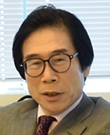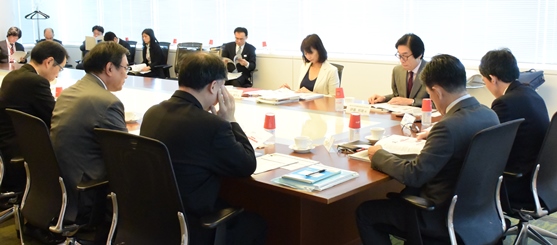Archived content
NOTE: this is an archived page and the content is likely to be out of date.
Stakeholder Dialogue
Dialogues with Stakeholders
The Fujitsu Group hosts periodic dialogues between outside experts and Fujitsu executives to enhance our management through the opinions of diverse stakeholders. In fiscal 2014, we held exchanges of ideas on ideals for information disclosure with sustainability considered.
The Relationship between Companies' Information Disclosure and Investors, with Sustainability Considered
Experts:
Kunio Ito, Professor, Graduate School of Commerce and Management, Hitotsubashi University
Ayako Sonoda, President, Cre-en Inc.
Fujitsu:
Masami Fujita, Corporate Senior Executive VP and Representative Director,
Head of Global Corporate Functions
Mitsuya Yasui, Corporate Executive Officer, EVP, Head of Legal,
Compliance & IP Unit
Kazuo Yuasa, Executive Vice President, Vice Head of Corporate Finance Unit
*1 The positions and titles of participants are as of the time of the dialogue.
 Kunio Ito, Professor, Graduate School of Commerce and Management,
Kunio Ito, Professor, Graduate School of Commerce and Management,
Hitotsubashi University
 Ayako Sonoda, President,
Ayako Sonoda, President,
Cre-en Inc.
Ito: Amid globalization, Japanese companies have come to be evaluated by the same yardstick as companies overseas. There has been attention focused on Japanese companies' continuously low profitability, despite their high level of latent capacity for creating innovation. In discussions on the conflicting issues of initiatives to create innovation in the medium- and long-term versus evaluations performed yearly to improve capital productivity, introducing external perspectives into a company's logic to add a tension dynamic is the essence of corporate governance, which further requires companies to present medium- and long-term scenarios through dialogs with investor and through integrated reporting.
Sonoda: Sustainability has risen in importance since the Lehman Brothers collapse, and the current trend is to consider management in an integrated fashion with non-financial information. Within the globally shared issue of SDGs*2, the question of what companies and business should do on behalf of sustainable development is posed, and integrated thought is accelerating. Examples of more committed communication by companies are appearing, such as policy recommendations for business expansion and analyst briefings on non-financial information (environmental, social, and governance, or ESG).
Ito: The relationship between companies and investors is entering a new phase, in which these parties are not in opposition but instead cooperate on the sustainable creation of value.
Fujita: Consciousness has been changing recently among investors, which has impressed upon me that short term-oriented management is not acceptable. One of the themes of the Ito Report is the evaluation of innovation over the long term. Fujitsu is engaged in a number of long-term development projects that contain a wealth of innovation, and evaluation of this is a huge issue for us as well. It seems to me that setting a corporate governance code (hereinafter CG code) has resulted in the appearance of guidelines for management based on a long-term perspective.
Yasui: With regard to corporate governance, we established committees ahead of other companies and created a structure in which Non-Executive Directors made up a majority of Directors overall. On top of that, we took our CG code initiatives in a positive sense as opportunities, not costs, and, to energize discussion over the medium- and long-term direction of the company, decided to establish an Independent Directors & Auditors Council so that executive and non-executive officers can attend Board of Directors meetings with the same level of access to information.
Ito: With so many companies talking about "adapting to" CG codes, it's great to see Fujitsu actively undertaking a variety of initiatives based on its CG code.
Yuasa: We adopted IFRS in the previous fiscal year, and can now perform financial reporting from the same viewpoint as global investors, following international standards. We've constructed a global matrix structure and are providing information from a variety of approaches. However, with regard to evaluating innovation, at present we're struggling with how to concisely convey the value of massive investment projects such as supercomputers, to name an example. We recognize that along with putting out information that is of use in making management decisions, providing useful information to investors is an ongoing issue.
Ito: In medium- to long-term investment, investors look at whether a company is facing up to, analyzing, and taking measures against various risks, and whether the company even has the ability to do so. Investors want companies to deploy diverse human resources to analyze and prepare against various potential risks, and to explain this. It would be good to ask investors what sorts of risks concern them.
Sonoda: Around the world, "resilient" has become a key word. It refers to not only disaster readiness but also the toughness and flexibility to adapt to change. What's important in the term is thinking in integrated fashion about elements such as the sharing of corporate philosophy and unwavering decisions by corporate management, and connecting this thinking to action. When companies use backcasting to consider the present based on the future, I'd like them to completely throw out their record of successes from the past to the present, and instead use all-new ideas to consider what mechanisms are needed, on the basis of future values.
Fujita: In the past, forecasting, or first completing a product and then thinking about what to use it for, was the dominant thinking. We're now tackling the backcasting way of thinking, but there is no correct way for looking toward the future, and it's not yet an established practice in our company.
Ito: In Japan, it's thought that medium- to long-term innovation also requires time for business decisions. But out in the world, business moves quickly even while taking a long-term perspective, as seen in quick decisions on acquiring ventures from which innovation will sprout. As long-term investment looks at a 3-to-5-year time frame at most, disagreements can come up in communication with investors when we explain that innovation requires a long time.
Sonoda: The connection between Human Centric Intelligent Society, or the vision that Fujitsu paints for the future using ICT, and our current condition seems a thin one. While looking at the very long term of 2030, it's necessary to point to 2020. What's important is not considering that to be difficult, but to instead take ideas on how it could be done and turn those into positive thinking.
Ito: In Japanese companies, the CIO and CFO are not often involved in the company's strategic decision-making, and ICT isn't yet leveraged in business model innovation. I'd like to see Fujitsu, as a representative ICT company in Japan, present a model example in this area through integrated reporting, while providing beneficial services to Japanese industry.
Yuasa: In the past, Fujitsu CFOs had come from the Corporate Finance Unit, but the current CFO was previously Head of the Corporate Planning and Business Strategy Office. From this year he's working again on management strategy in addition to working in the Corporate Finance Unit, and personally I, too, am motivated by the importance of connecting finance to strategy in corporate management.
Ito: That's wonderful. From here on out, the role of reporting – that is, the role of integrated reports – will change the nature of organizations. If Fujitsu is going to construct a global matrix structure and carry out integrated reporting under that framework, I hope that it can take reporting as an opportunity to transform the company to make its organizations integrated, and I hope to see this become a best practice.
Yasui: Right now, disclosure of information outside the company is divided among several departments. Because of this, the content we communicate is disjointed, which has an impact on decision-making within the company, too. I feel a need to set up an organization with external communication in mind, and to unify information as our corporate communication.
Ito: Fujitsu and other Japanese companies value technology. What I want Fujitsu to do is be aware of the degree to which it can enhance its corporate value through technology, and turn its initiatives into value. It needs to enhance its earning power through value and change its mindset, from top management to ordinary employees, to a mindset of making money in order to give birth to innovation and of raising the value of the company. Even in setting a three-year medium-term plan, it's necessary to look 10 years ahead.
Summary by Masami Fujita, Corporate Senior Executive VP and Representative Director, Head of Global Corporate Functions
We bring outside perspectives into our management, through actions such as reflecting the Board of Directors' deliberations into the Management Council. However, listening to today's discussion, I felt the need for further enhancement of Fujitsu's external communication capabilities. I hope to strengthen our engagement with investors and stakeholders through communication centered on integrated reporting, and hope to consider a vision for reporting, and by extension, the organization, so that our engagement can be of aid in increasing corporate value.
*2 SDGs (Sustainable Development Goals):
Development goals to be addressed from 2015, the deadline for achievement of the Millennium Development Goals (MDGs) set by the United Nations in 2000. The SDGs aim to address a wide range of issues including climate change, energy issues, disasters, and disparities, with 17 goals and 169 targets scheduled for adoption by the United Nations General Assembly in September 2015.
 A dialog with stakeholders
A dialog with stakeholders
